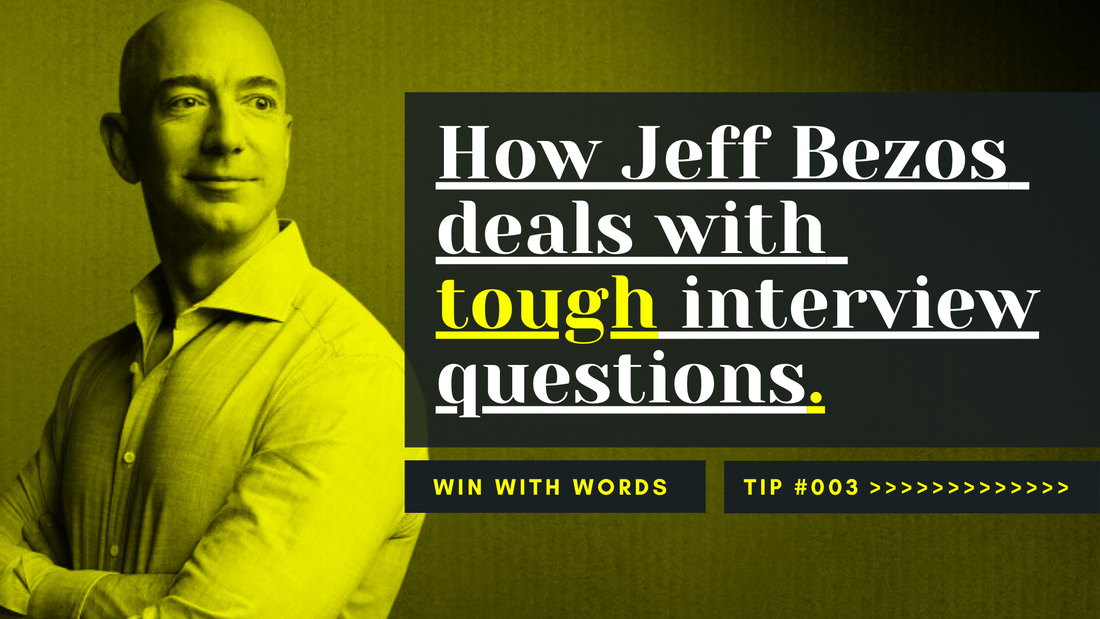|
Imagine you're the richest man on earth. How would you respond if, during an otherwise pleasant interview, you're confronted with accusations of low wages and inappropriate working conditions? Would you: OPTION A: Smile, thank the interviewer for the question, and subtly change the subject OPTION B: Tell the interviewer that you welcome such scrutiny OPTION C: Suggest the accusations are baseless Watching Jeff Bezos - Founder & CEO of Amazon - being interviewed is a masterclass in how to tackle seemingly awkward questions. In fact, if I reviewed his technique, I'd give him 4 stars. Repeatedly, during the interview, Bezos defuses challenging questions by empathising with them - which subconsciously (and somewhat cleverly) builds trust among the viewing public. On three different occasions, he deploys OPTION B with effortless skill. Watch this exert, for example: Why this technique works During a recent plunge down a psychology rabbit hole, I found a wonderful article, by renowned Tibetan spiritual leader Sakyong Mipham, in which he suggests that, "Common ground provides a pathway to communication, which leads to trust." Bezos not only understands that the average person has justified questions about Amazon's alleged anti-competition practices, but in a breathtaking moment of slight-of-hand, he aligns himself with said average person. By referencing the need for all large entities, specifically governments, to be held accountable for their activities, he cultivates common ground. Who would argue against the need to monitor governments and multi-billion pound companies? No one, and by championing the merits of this, Bezos not only finds common ground with the average person in the street, but in turn, develops trust. But wait - it gets even better! In the next clip, see if you can spot how Bezos further aligns himself with the average person. REMEMBER, with a reported net worth of $182 billion, calling Jeff Bezos 'average' is a bit rich (pun intended) How Bezos aligns himself with regular folk According to my recent Google search, there are roughly three-thousand billionaires in the world - of which Bezos is No.1. Sure. that leaves the rest of us looking-on from a distance, struggling to relate, yet still, Bezos finds common ground by alluding to our "natural instinct to be sceptical and mindful of large institutions", citing governments, the police and military organisations as key targets for this scepticism. Again, this is undeniable - we do, as a collective species, seek integrity from our highest social institutions, and by Bezos stating this widely held truth, we're more inclined to view him favourably. Why? Because as argued earlier, "Common ground provides a pathway to communication, which leads to trust." Did you spot Jeff's other clever trick? I'd be negligent to not spotlight Bezos' repeated use of the word "we". In the second clip above, he used the word four times. Why is that relevant? Well, remember, the original question asserts that Amazon is sometimes portrayed as "the evil of the world", and by Bezos adopting a 'we' stance (i.e. humans) instead of an 'us' stance (.e. Amazon), he subtly defuses the prickly 'Amazon Vs The World' viewpoint. Psychologist Rick Hanson sums-up trust-building nicely, suggesting that, ".. as you see the deep ways we're like each other, a wary tension in the body eases - then you see others more clearly, and can be more effective with them, even those you oppose fiercely." In my considered opinion, by Bezos deploying "we" so many times in his answer, he cleverly shelters under the age-old maxim 'if you can't beat them, join them'. To explain what I mean by this, here's my rough translation of the answer he gave in clip 2: "Yes, Amazon is huge, wealthy and one of the four biggest companies on earth. I can't argue otherwise, so I won't. Instead, I'll remind you that I'm human, just like you - and I have the same concerns as you. Wow, we're so alike - let's go for a beer." [Watch the full Jeff Bezos interview here] Other successful people who use this technique When I train clients ahead of their TV and radio interviews, 'empathy' is a powerful techniques I zealously advocate. As I showed you recently with cultural icon Taylor Swift, empathy carries real potency. Notice how Swift adopts a different technique to Bezos, but one that is equally as effective at defusing awkward questions? Let's conclude with one final (and very famous) example of using empathy to suppress an awkward question. During a 1997 tech summit, Steve Jobs' competence was publicly challenged by someone in the audience. Jobs' response has become something of a legacy. How did he respond? By agreeing with the attack - not only defusing the situation, but delivering a beautifully well-judged and highly endearing slap to the face. Or should that be sl-app to the face? NEED PR HELP? GET IN TOUCH:
Or click here for FREE access to our other excessively brilliant writing & communications articles.
0 Comments
Leave a Reply. |
Categories
All
Archives
October 2023
|



 RSS Feed
RSS Feed